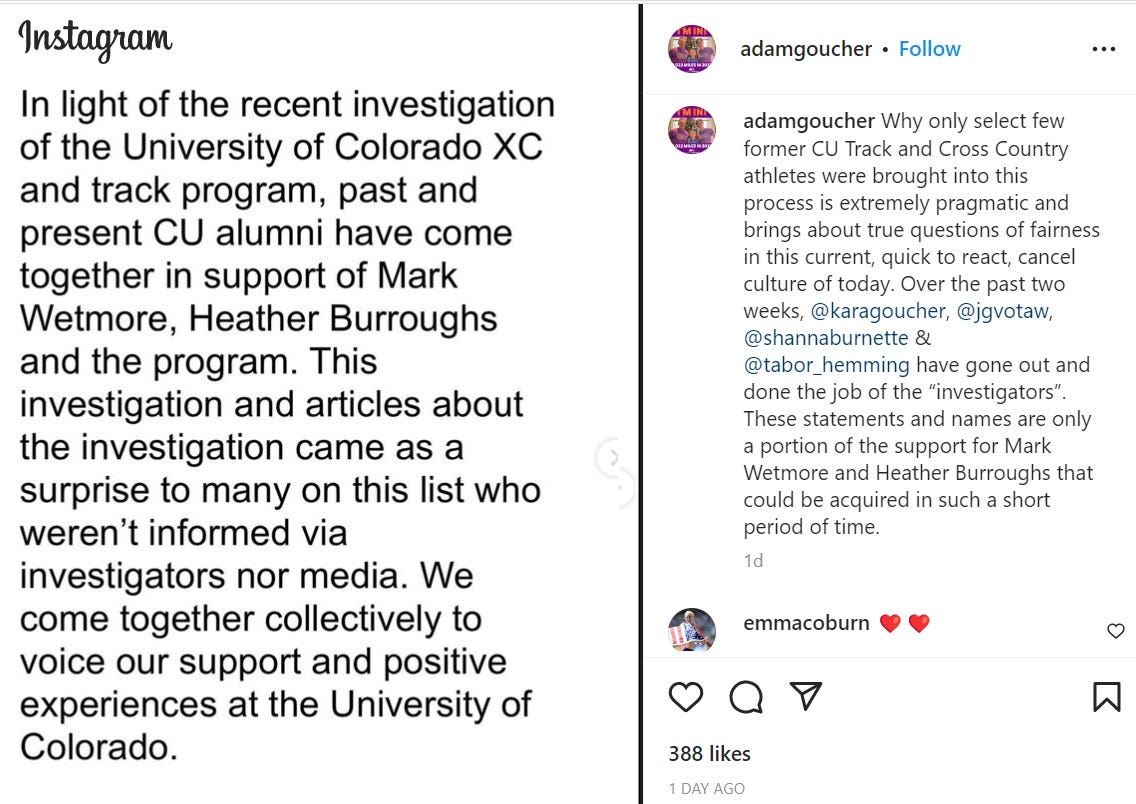Dozens of former University of Colorado runners express disgust at Runner's World's conviction of the program
The lesson isn't that the "reporter" got the story wrong. It's that she's a hatchet-lady who made no effort to get it right and never does
Adam Goucher is a 2000 U.S. Olympian in the 5,000 meters and the nominal protagonist of Running with the Buffaloes, a deep and absorbing look by Chris Lear into the 1998 University of Colorado men’s cross-country team’s star-crossed but ultimately triumphant season. No matter how many great C.U. runners come along, Goucher will always be known as one of the most driven and winning-focused athletes of them all.
Yesterday, Goucher made an Instagram post criticizing the one-sided piece Runner’s World published the day before the 2022 NCAA D-I Cross Country Championships last fall, at which the Colorado men’s and women’s teams both competed.
If you click through to the post, you’ll see uploaded screen shots of specific and supportive comments from Goucher’s wife Kara, Jenny Simpson, Emma Coburn, Jorge Torres, Dani Jones, and around three dozen other ex-Buffaloes—some of them very recent graduates of the program, others having departed in a bygone century.
From my post about the controversy as it was unfolding in late November:
Those who have thrived as runners at C.U. seem to carry an understanding that the environment isn’t for everyone—which, as with any sports milieu, doesn’t necessarily make it pathological.
The runner who came forward was a walk-on with no sense of what things would have been like elsewhere. But if she was willing to deal with the very worst kind of uncooperative bureaucrats so that the world could get its first somewhat unvarnished look under the C.U. hood, then good for her.
The persistent wish-making that goes on with these expose’-style stories, however, is problematic. The idea that lighter is faster for a distance runner (within reason) is true. If weight and running performance were significantly uncoupled, then competitive running wouldn’t include a higher-than-normal number of people who go to sometimes harmful lengths to control their weight.
This sums up my continuing view, which is unaffected by the outpouring of pro-Wetmore and pro-Burroughs comments: Some people will thrive in a given setting while others will not. In that post, I also named some people who have done well as professionals who never would have added their names to Goucher’s long and impressive roster. Any story that only focuses on the unfortunates is nothing more than a grievance on behalf of the non-thrivers, whatever later becomes of their running, just as one giving only the thrivers’ perspective is no expose’.
But trashy grievances are Cindy Kuzma’s nom de plume. Goucher doesn’t name Runner’s World or the hit piece’s author, but I think he should have at least tagged RW, and let them know that not only do they not do real journalism, they’re also hypocrites about this very issue. Sadly, however, Goucher may be unaware of the second part, even if he’s probably inferred it.
On January 13, less than two months after Kuzma unspooled her salvo against Wetmore et al., she produced another anti-body-composition plea for the same outlet—one RW sagely decided to publish one day after running a “Here’s why body-composition monitoring is helpful” piece.
Runner’s World is a demoralized outlet, but a frequent by-product of this kind of decay is unintentionally brilliant comic timing, and RW has this aspect of its own greasy failure nailed.
I know some of the signatories of Goucher’s letter and have met others in passing. One person in particular who never would have added his name without thoughtful consideration of what he was doing is Marcus Allen-Hille, who has worked with possibly hundreds of Buffaloes in his career. It is beyond obvious that the University of Colorado has created a disproportionate number of high-level success stories while proving to be unstable soil for others.
But the point isn’t what sort of overall score Wetmore and Burroughs should ultimately receive on the matter of how suitable their program is; that’s impossible for anyone to broadly adjudicate thanks to the vast interpersonal variation among student-athletes. The one clear and irrefutable take-home message is that Runner’s World has committed another journalistic failure—one it’s unlikely to comment on, much less apologize for, since this stuff is, as Goucher observed, baked into the flaccid minds of today’s cancel-culture vultures. It drew rage-clicks and upset some genuine athletes, so despite its lack of balance and thus veracity, or any reputational harms done, from RW’s perspective, this is “mission accomplished” all the way.



